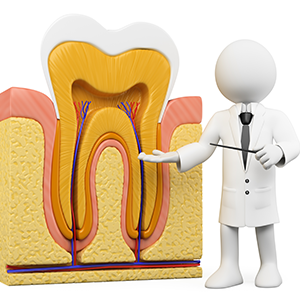
For teeth that have become deeply infected, there is no treatment more important than the root canal procedure. If a tooth's pulp chamber has become decayed and left without treatment, the infection can spread to other areas of the face, swelling in those areas and causing bone loss around the tooth root.
A root canal procedure prevents the spread of infection by simply removing the pulp and nerve from the decaying tooth. The "pulp" is the soft area within the tooth that contains the nerve.
Read Simon G.'s review of Sona Asatryan DDS - Fair Oaks Dental Group on Yelp
Read Samantha R.'s review of Sona Asatryan DDS - Fair Oaks Dental Group on Yelp
The nerve provides only a heat sensory function in the tooth and is not needed for the normal biting and chewing function of the tooth.
The nerve or pulp of a tooth can be damaged in a number of ways, including:
You should contact a dentist if you experience severe pain or prolonged sensitivity in a tooth from hot or cold temperatures or chewing, discoloration of the tooth, or swelling and tenderness of the gums.
Root canal procedures begin with an X-ray to check for damage in surrounding teeth. The dentist will then apply local anesthesia to ensure the patient feels no pain (even if the nerve in the tooth is dead and non-functioning). A sheet of rubber will be used to keep the area of the tooth dry while the dentist works.
A small hole is drilled and the pulp and decayed tissue are removed. The tooth will then be cleaned and sealed with a rubber compound, almost like a filling. Because a tooth that requires a root canal procedure has most likely endured a great deal of damage from the infected pulp, the tooth may need further restoration and protection from a crown.
While root canal procedures have a notorious reputation for being extremely painful, the truth is that it usually is not painful at all. With local anesthetic, patients should feel no more pain than they would when getting a dental filling. However, the tooth may be sensitive after the procedure. Even if there is no pain, try to minimize chewing with a recently treated tooth, as it may be fragile for some time.
For more information about Root Canals or other Dentistry Services call our office at (626) 431-2654 or Contact Us online.